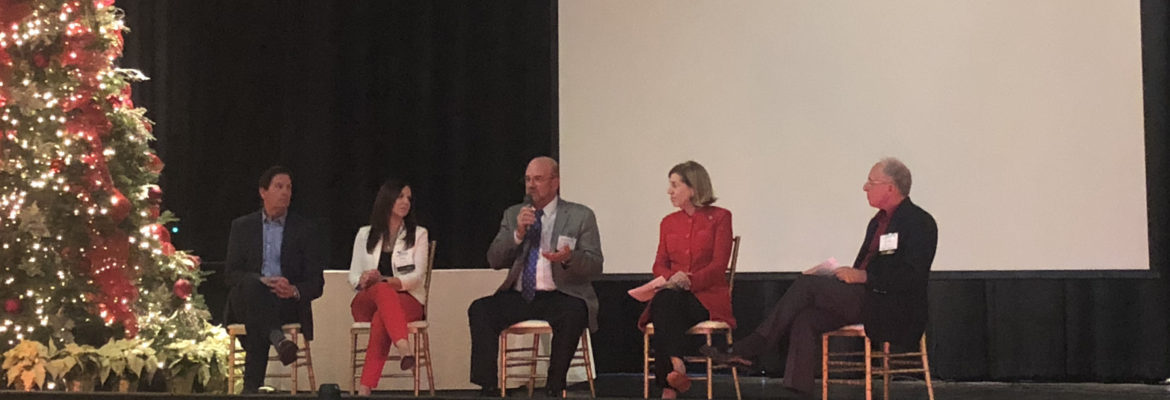San Diego State University (SDSU) aims to start land purchase negotiations with the City of SanDiego for the Mission Valley stadium site in the first quarter of next year and play its first football game in a new stadium in 2022. This is according toGina Jacobs, AssistantVP of Divisional Communications & Strategy, Business and Financial Affairs for SDSU and a panelist at a recent Citizens Coordinate for Century 3 (C-3) and League of Women Voters panel discussion about the future of the stadium site.
Also included on the panel, which was moderated by C-3 board member Cary Lowe, were City of San Diego Council members Barbara Bry and Scott Sherman, as well as President and CEO of JMI Realty John Kratzer, who serves as SDSU’s site plan consultant.
Audience members and the city council members expressed concern that once SDSU purchases the land, the City of San Diego loses direct land use approval and its ability to enforce the community plan, ceding oversight to the state of California and the SDSU board of trustees.
“At the end of the day, the only thing we have in our control is the sale,” said Councilmember Sherman. “I’m looking forward to the negotiations, so we can get the best value for the city.”
Council member Bry suggested that the City of San Diego can build land use terms into the sale agreement to exert some control, including stipulations about affordable and low-income housing.
“I’m also interested in whether some of the land can be leased,” she said. “How can this benefit tax payers in the long run? Will the city be able to participate down the road? Ultimately, we want to hear from the people and what they want.”
To that effect, Jacobs shared that SDSU has made more than 100 presentations to planning groups, special interest groups, environmental groups and others about its stadium site proposal.
“We are very proud of our outreach thus far,” she added. “We are open to talking about more community input.”
While the majority of the 166-acre site will be sold to SDSU, as agreed under Proposition G, which San Diego voters approved in November, 34 acres of the River Park will remain under theCity of San Diego’s control.
Answering an audience question about the River Park, Councilmember Sherman said, “We don’t know who is going to build it or who is going to maintain it. Hopefully we’ll gain some more clarity down the road.”
Asked about the environmental responsibility of SDSU’s development plan, Kratzer answered, “The environmental community supported our efforts, so I think that says a lot. This is a big plan and there is a lot happening. We have bike paths stretching all over town. And that’s something I’m most excited about.”
C-3 plans to lead an organized effort to engage the public in both the sale agreement negotiations and SDSU’s design effort, with a kick-off meeting on a date to be determined in January, 2019. C-3 also supports calls to form a Public Advisory Committee, considering this project presents a unique opportunity to make a positive impact on all of Mission Valley.
Founded in 1961, C-3’s mission is to advocate, educate and develop solutions for maintaining high standards of environmental quality, physical design, economic benefit and social progress. C-3 gathers and disseminates information, facilitates civic dialogue and encourages well-thought-out opinions. Its founders said the overall goal is to make San Diego a “handsome community.”

